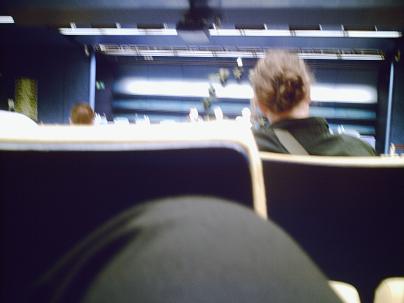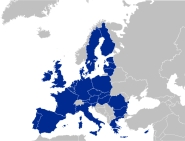Yes, I did promise a few more juicy myths about the European Union quite some time ago, but hey, I’ve been working. 🙂 Anyway, here’s an old favourite:
Myth: The EU headquarters hosts a multi-storey super-computer, called “The Beast”, which tracks the movements of all people on the face of the Earth. This is a predecessor of the forthcoming Antichrist rule of the world.
EU headquarters hosts a multi-storey super-computer, called “The Beast”, which tracks the movements of all people on the face of the Earth. This is a predecessor of the forthcoming Antichrist rule of the world.
This is a myth that has only started to fade, probably to the improvements of technology, which has by now made most people realise that there is no longer any need for any multi-storey computers; the computer you use to read this is probably more powerful. Nevertheless, it is still put forward as truth, as I noticed when doing some quick research for this blog entry, and was pretty widespread for many years among many of my fellow Christians who believe that the EU in some way will be either the personification itself or a vehicle for the anti-Christian rule of the last days foretold in the Book of Revelation.
I shall deal more in detail with the idea that the EU has such a function in a forthcoming Euromyths blog entry, because it deserves some attention in itself. However, let’s get past this computer stuff first.
This is actually a myth whose origins, unusually enough, can be traced.
 It all started with a novel, Behold A Pale Horse by Joe Musser, published in 1970; a fictionalised account of the last days as foretold in the Bible, in the same genre as would later be popularised by the Left Behind series. As the account goes, there was a mention of such a computer in that book, which was later put to graphic depiction when the book was made into a film, The Rapture. The film was marketed with some mock newspaper-like publications running “the story” about the super-computer.
It all started with a novel, Behold A Pale Horse by Joe Musser, published in 1970; a fictionalised account of the last days as foretold in the Bible, in the same genre as would later be popularised by the Left Behind series. As the account goes, there was a mention of such a computer in that book, which was later put to graphic depiction when the book was made into a film, The Rapture. The film was marketed with some mock newspaper-like publications running “the story” about the super-computer.
Apparently, the disclaimer on these fake papers was either too obscure or not prominent enough, and the story was picked up as fact and passed on. Joe Musser himself is said to have been shocked that his fiction was being reported as fact, and has tried to refute it, but to no avail.
It is easy to see why this fiction was so readily believed by so many. Remember, in those days and for many more years to come, computers were very unknown and very scary. They were usually seen as anonymous threat, often possessing some kind of human-like attributes. When I grew up in the 1980s, for instance, there was a very real and vivid public debate about how the computerisation of society would increasingly steal people’s jobs, if not making humans obsolete altogether in one area after another. The whole Terminator film series builds on this very premise, and “The Computer” was named Time Magazine’s Man of the Year in 1982, further cementing its status as bearing human qualifications.
For generations, Christians have read the last Book of the Bible with varying degrees of fear and awe, anxiously trying to identify the various characters there in their own time. Come the early 1970s, suddenly things would have fallen into place: ‘Of course… the Beast won’t be a real human… it’s a computer.’
Add to that the general ignorance of what computers were in those days, as well as the limited possibilities to check urban legends during the pre-Information Age, and you have fertile ground for computer lore.
One might think that the idea would have fallen on its own unreasonability, to anyone who would stop and think. In those days, the then Common Market that would later evolve into the EU only had six member states, becoming nine in 1973. Violently gigantic chunks of the globe were outside of the Common Market’s reach; not only the Americas or Africa, but the entire Communist world, which certainly would never have fed the Western world any details of its inhabitants!
To make things even more complicated, not even the member states themselves had much track of their citizens; Britain, for instance, one of the new members in 1973, lacks a central population register to this day. To imagine that there would be any interest, capacity, or even resources within the Common Market of a few Western European nations to go out and e.g. identify inhabitants of remote tribal villages in Borneo’s jungles or Australia’s outback is so outrageous that it should have made even the most hardened conspiracy theorist stop and think.
Satellites were rare and certainly not commercially available, wireless communication clumsy, and digital technology in its infancy – the sheer logistic and technological problems of such a scheme would have been impossible to overcome. And then there is the question of who on Earth would have been prepared to pay for such a venture, bearing in mind how picky member states havd usually been about not paying one penny more than necessary to the Common Market/EEC/EC/EU and getting as much as possible back.
 As readers of this blog know, the most commonly named location for this machine – the famous Berlaymonster – was gutted between 1991 and 2004. There are no records of any such technology being either found or transported from that site, nor has anyone who would have worked at the site come forward with any such revelation. And mind you, they have come forward in other contexts, most notably to complain about the hazards they were exposed to when tearing out all the asbestos in there.
As readers of this blog know, the most commonly named location for this machine – the famous Berlaymonster – was gutted between 1991 and 2004. There are no records of any such technology being either found or transported from that site, nor has anyone who would have worked at the site come forward with any such revelation. And mind you, they have come forward in other contexts, most notably to complain about the hazards they were exposed to when tearing out all the asbestos in there.
And, once again, needless to say, computer technology of the 1970s won’t exactly let you play your favourite PlayStation games.
It is true that the EU has traditionally been quite advanced in terms of databases – for Community legislation and the like; in the same way as we now take for granted that most official documents produced by any government are available over the Internet.
If ever I come across any suspicious-looking computer equipment at the EU, I promise you’ll be the first to know. Until then, you can safely assume that this is a myth.
(Footnote: To avoid all misunderstanding, maybe I should add that I have not taken any of the above pictures at any computer centrals in any EU buildings. In fact, I have not taken them myself at all, but happily gleaned them from Wikimedia Commons’ Historical Computers category. They depict, from top to bottom, the SAGE AN/FSQ-7 at the American air defence NORAD; Harvard Mark I; an R2-D2-looking tin can from the now defunct Datasaab – believe it or not, called Datasaab D2!; and the ENIAC.)






 EU headquarters hosts a multi-storey super-computer, called “The Beast”, which tracks the movements of all people on the face of the Earth. This is a predecessor of the forthcoming Antichrist rule of the world.
EU headquarters hosts a multi-storey super-computer, called “The Beast”, which tracks the movements of all people on the face of the Earth. This is a predecessor of the forthcoming Antichrist rule of the world. It all started with a novel,
It all started with a novel, 
 As readers of this blog know, the most commonly named location for this machine –
As readers of this blog know, the most commonly named location for this machine –  painstakingly hand-sewn down to the last stitch, of the kind which you can see on the picture here (no, it’s not from the Brussels event, because of course I forgot my camera). All the way, of course, down to the smallest children.
painstakingly hand-sewn down to the last stitch, of the kind which you can see on the picture here (no, it’s not from the Brussels event, because of course I forgot my camera). All the way, of course, down to the smallest children. That in itself would have been enough to make us feel as popular at the celebration of that independence as bacon sandwiches at a Bar Mitzvah, but to add insult to injury, we suddenly discovered that we had managed to top off our oldest son’s jeans, sweater and gym shoes outfit with a cap with the word “Sweden” in large gold letters across the front.
That in itself would have been enough to make us feel as popular at the celebration of that independence as bacon sandwiches at a Bar Mitzvah, but to add insult to injury, we suddenly discovered that we had managed to top off our oldest son’s jeans, sweater and gym shoes outfit with a cap with the word “Sweden” in large gold letters across the front.
 aren’t even pretending that there will be any outcome of that meeting; and when plenty of EU member states want the meeting called off altogether. (The reason for the fuss is a quick deterioration in EU-Russian relations, due to Russia’s blocking of Polish meat, which Poland takes as retaliation for being too friendly with the West, and due to Russia’s retaliation against Estonia for moving a Soviet-era monument, with thinly-veiled acts of economical warfare against EU member Estonia. Russia, on the other hand, seems to be having problems with the plans to post new US missiles in Poland and Hungary, pointing at Moscow.)
aren’t even pretending that there will be any outcome of that meeting; and when plenty of EU member states want the meeting called off altogether. (The reason for the fuss is a quick deterioration in EU-Russian relations, due to Russia’s blocking of Polish meat, which Poland takes as retaliation for being too friendly with the West, and due to Russia’s retaliation against Estonia for moving a Soviet-era monument, with thinly-veiled acts of economical warfare against EU member Estonia. Russia, on the other hand, seems to be having problems with the plans to post new US missiles in Poland and Hungary, pointing at Moscow.) era and fire away this shot from my seat to give you an idea about what it looks like (don’t tell anyone, will you).
era and fire away this shot from my seat to give you an idea about what it looks like (don’t tell anyone, will you). Towards me stared the self-sufficient face of an old man, bearing only remote resemblance to what I consider being the image greeting me in the mirror each morning. A stuffy old git, with thin hair and fluffy cheeks, instead of the other way round. Yeaouwch! Is that suppose to be me?
Towards me stared the self-sufficient face of an old man, bearing only remote resemblance to what I consider being the image greeting me in the mirror each morning. A stuffy old git, with thin hair and fluffy cheeks, instead of the other way round. Yeaouwch! Is that suppose to be me?










